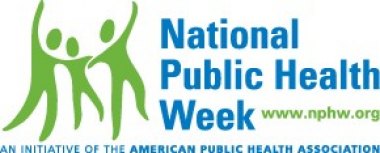Kings County Health gets the word out about National Public Health Week

Children starting kindergarten must show proof of receiving the following vaccines: diphtheria, pertussis, and tetanus (DPT); polio; measles, mumps, and rubella (MMR); Hepatitis B; and varicella (chickenpox). Children entering seventh grade must show proof of receiving tetanus, reduced diphtheria, and acellular pertussis (Tdap) vaccine and two doses of MMR. It’s important for parents to check with their pediatricians to make sure children have all school mandated vaccines as well as all medically recommended vaccines for good health.
But why are vaccines so important? Vaccines not only protect the individual from disease but also protect the community. Typically, when a bug enters the body, the body’s immune system fights it. However, the immune system may not work fast enough to prevent a germ from causing disease, so people still get symptoms. Vaccinations work by introducing a dead or weakened form of a virus into the body. The body recognizes the illness and builds up its defense against it. If a person is exposed to an actual, “wild” form of the disease, the immune system can recognize it and fight the illness.
If enough people get vaccinated, then eventually some diseases can be considered eradicated, meaning they no longer exist in the general population. Smallpox is one of these diseases. According to the Centers for Disease Control and Prevention, smallpox is characterized by fever and a progressive skin rash. Worldwide, three out of every ten people who got smallpox died, and survivors were often left with severe scars. In the 1960’s, public health laboratories across the world began a program to eradicate smallpox and worked hard to not only identify and investigate outbreaks but to provide mass vaccination campaigns to protect the public against the disease. The last natural outbreak of smallpox in the world occurred in 1977, and it was officially declared eradicated in 1980.
Most diseases, however, are not entirely gone and still exist throughout the world. Many diseases are only a “plane ride away,” meaning that it is possible for someone from a country where a condition is more common to bring it to the United States. People who are not vaccinated are at risk of being infected. Those who are at the highest risk include newborn babies, small children, and people with weakened immune systems due to illness or medications. However, if most of the population is vaccinated, it dramatically reduces the risk those who cannot be immunized from becoming infected.
Vaccinations are not just for children. Adults still need regular immunizations for both seasonal illnesses and other conditions. For example, adults and children should get their influenza vaccine each year, and adults should receive a tetanus/diphtheria booster shot every ten years. Illnesses such as shingles primarily affect older adults, but people can be protected from shingles by getting the shingles vaccination. Adults traveling to foreign countries may also need to get immunizations to protect them from diseases overseas, such as yellow fever or typhoid fever. People who travel should check with their doctor, who can recommend travel vaccines based on where a person is traveling and their medical history.
The Kings County Health Department’s clinic provides vaccinations for those with Medi-Cal/Medicare, private insurance, and with no insurance. The clinic not only provides the immunizations children need to enter school, but also provides immunizations for students going off to college, routine vaccinations for adults, and travel immunizations.
This article is published in recognition of National Public Health Week. For more information about Public Health in Kings County visit our website at: www.countyofkings.com/health.
Opinion
- Valadao supports rural cooperatives, communities with legislation
- Kings Democrats condemn vandalism at Rep. Valadao's Hanford office
- Breaking down barriers to care and protecting seniors' well being
- A public perspective on health care and Medicare Advantage
- The Leader recommends Lupe Solis, Joe Neves be returned to local elected positions
- Westlands Water District celebrates 70th anniversary in San Joaquin Valley
_0.jpg)

.jpg)



